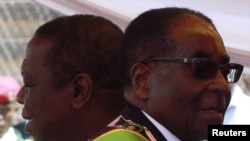HARARE —
In Zimbabwe, a two-day conference meant to reach common ground on a draft constitution ended Tuesday without setting a date for a referendum. The two major parties in Zimbabwe, ZANU-PF and the Movement for Democratic Change (MDC), still have fundamental disagreements and are sticking to their positions.
Despite failing to decide on a date for a constitutional referendum, Douglas Mwonzora, who chairs the committee tasked to write Zimbabwe’s new constitution, remains optimistic.
“It is possible to have a referendum by January next year. It is still theoretically possible to have it this year. But a lot of things need to be looked at, for example financing,” Mwonzora said.
One of the big hurdles is for the cash-strapped Zimbabwean government to find money for the referendum.
Also, Zimbabwe’s main political parties have failed to agree on the contents of the new constitution.
President Robert Mugabe’s ZANU-PF party is opposed to abolition of death penalty, introduction of a less powerful presidency, gay rights and dual citizenship. Prime Minister Morgan Tsvangirai’s MDC party has said politicians must not remove what Zimbabweans said they wanted during the outreach program.
Some Zimbabweans have started losing faith in the constitution process. Nigel Garawa is one of the people that attended the two-day conference.
“It looks like the draft constitution is only trying to address issues which are contentious on the side of ZANU-PF and MDC. We treat this document with suspicion,” Garawa said.
Regional leaders want a new constitution in Zimbabwe before there are elections to end the country’s fragile, three-year-old coalition government.
Opening the two-day conference on Monday, President Mugabe said Zimbabwe would have elections by March next year.
It remains to be seen how feasible that is given the issues surrounding the new constitution and the referendum.
If such a referendum can be held in Zimbabwe later this year, elections would be possible in 2013.
Despite failing to decide on a date for a constitutional referendum, Douglas Mwonzora, who chairs the committee tasked to write Zimbabwe’s new constitution, remains optimistic.
“It is possible to have a referendum by January next year. It is still theoretically possible to have it this year. But a lot of things need to be looked at, for example financing,” Mwonzora said.
One of the big hurdles is for the cash-strapped Zimbabwean government to find money for the referendum.
Also, Zimbabwe’s main political parties have failed to agree on the contents of the new constitution.
President Robert Mugabe’s ZANU-PF party is opposed to abolition of death penalty, introduction of a less powerful presidency, gay rights and dual citizenship. Prime Minister Morgan Tsvangirai’s MDC party has said politicians must not remove what Zimbabweans said they wanted during the outreach program.
Some Zimbabweans have started losing faith in the constitution process. Nigel Garawa is one of the people that attended the two-day conference.
“It looks like the draft constitution is only trying to address issues which are contentious on the side of ZANU-PF and MDC. We treat this document with suspicion,” Garawa said.
Regional leaders want a new constitution in Zimbabwe before there are elections to end the country’s fragile, three-year-old coalition government.
Opening the two-day conference on Monday, President Mugabe said Zimbabwe would have elections by March next year.
It remains to be seen how feasible that is given the issues surrounding the new constitution and the referendum.
If such a referendum can be held in Zimbabwe later this year, elections would be possible in 2013.




